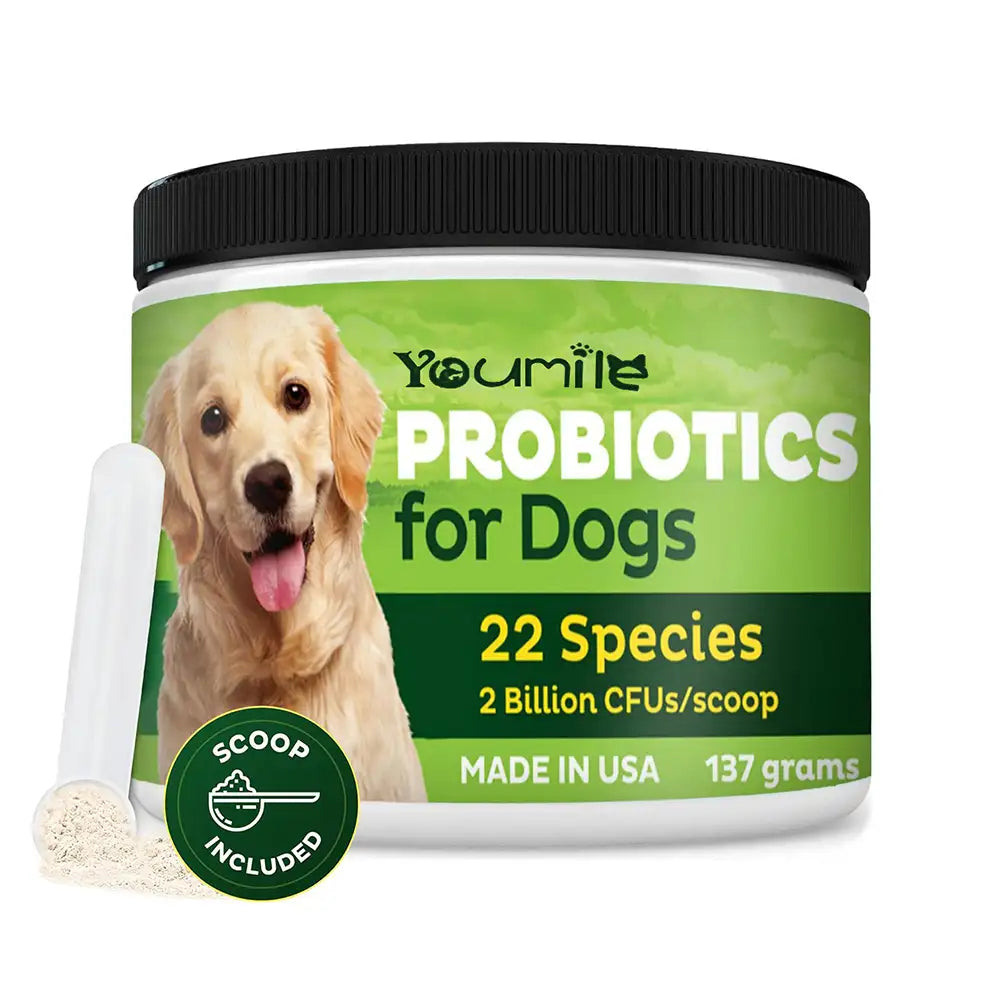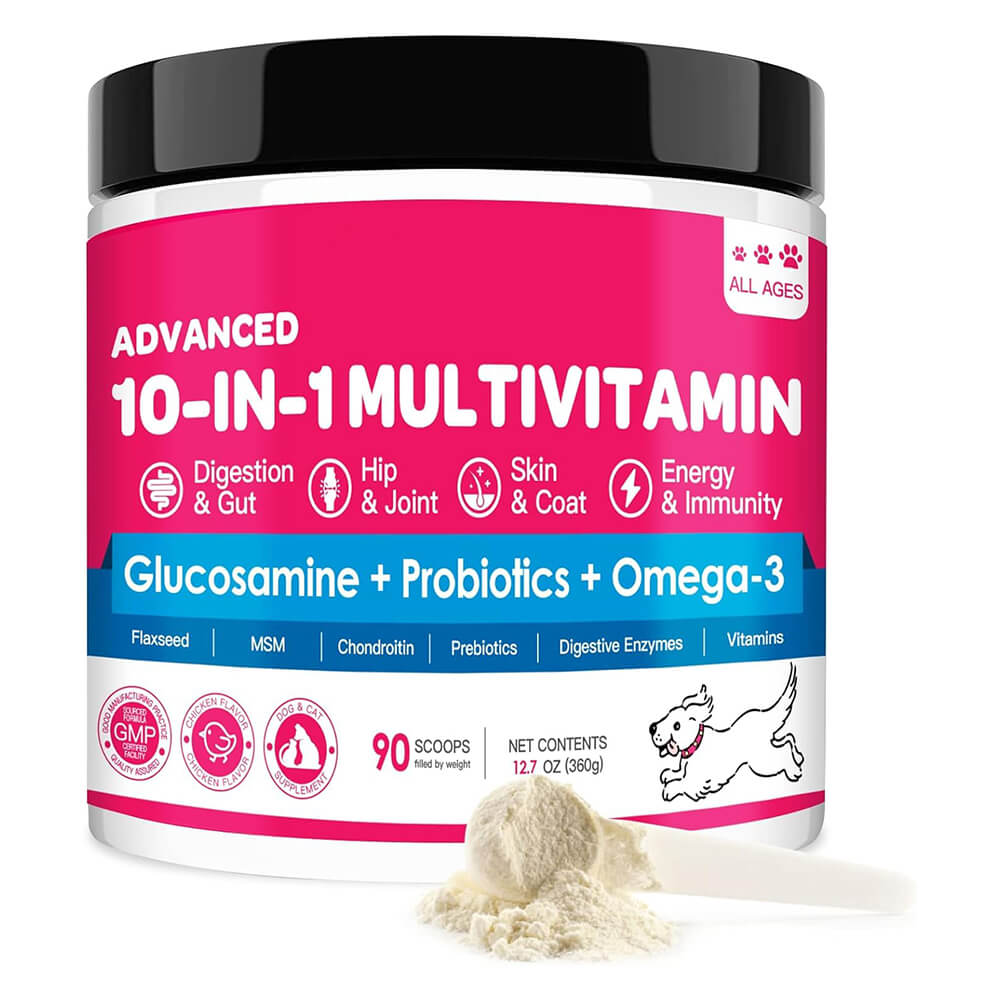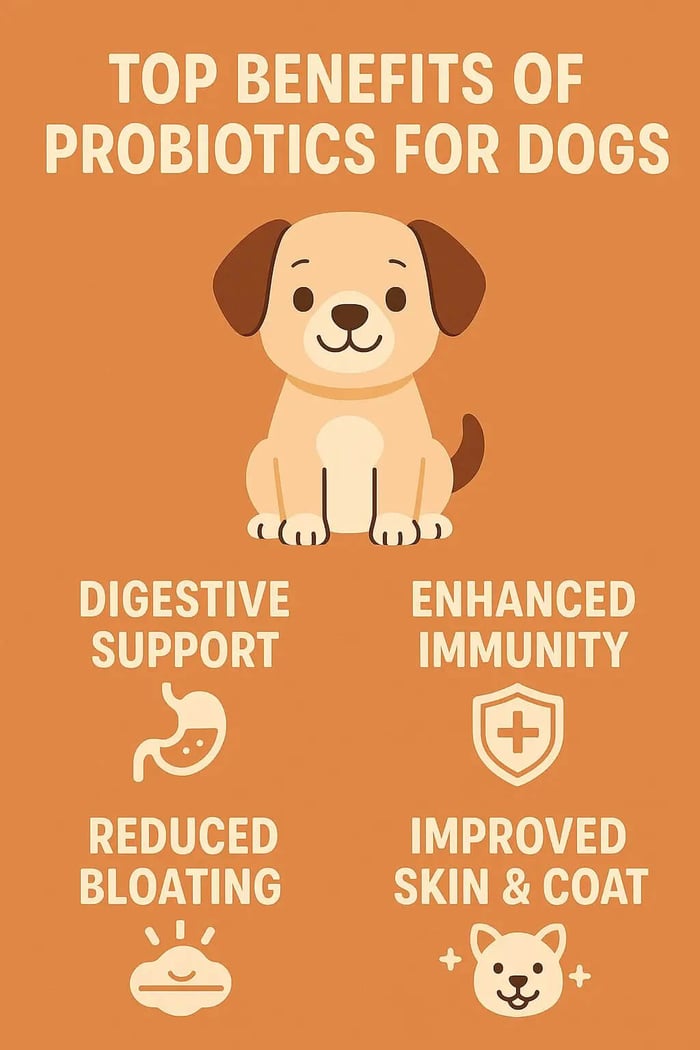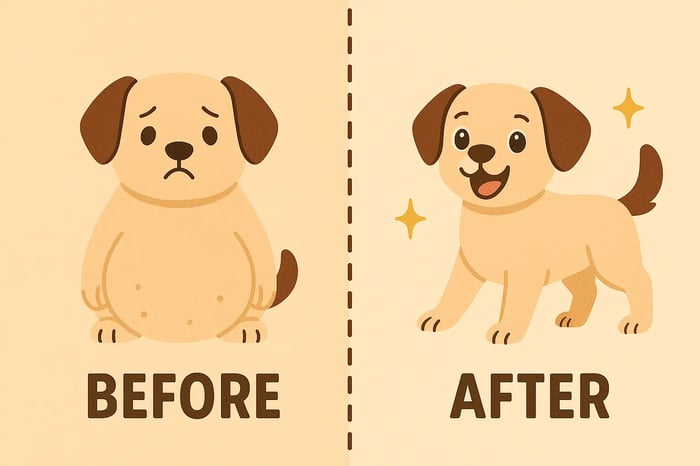Pet parents strive to provide their dogs with both happiness and wellness throughout their lives. Dogs share human-like digestive issues which include loose stool and bloating and occasional diarrhea that occurs after eating spoiled food or changing dog foods or experiencing stressful situations. Probiotics for dogs serve as a solution to address these issues. The beneficial bacteria in probiotics maintain a healthy gut microbiome while supporting digestive health and contributing to immune system function in dogs.
This guide explains how to choose a quality probiotic supplement while discussing the appropriate timing for administration and how our 6-strain soft chews deliver live cultures suitable for dogs across different life stages.
Recommended Products



What is a probiotic for dogs?
A probiotic for dogs refers to beneficial microorganisms which reside in your dog's digestive system to maintain proper gut microbiome equilibrium.
The digestive system of dogs becomes unbalanced when they experience dietary changes or stressful events or consume spoiled food or receive antibiotic treatment which results in gastrointestinal symptoms such as loose stool and gas and occasional diarrhea. A probiotic supplement for dogs works to bring back a balanced intestinal microbial environment while eliminating dangerous bacteria and maintaining digestive wellness and immune system health.

Benefits of Probiotics for Dogs
Probiotics for dogs introduced into your pet's daily routine will produce significant improvements in their health and happiness. The beneficial bacteria in probiotics function inside your dog's digestive system to establish a healthy intestinal microbial equilibrium. The health benefits they provide extend from short-term comfort to long-term overall wellness.
1. Support digestive health
Probiotics enable the breakdown of food while enhancing nutrient absorption to maintain proper digestive system operation. The digestive system experiences reduced instances of loose stool and diarrhea and gastrointestinal disturbances from new foods and stress and spoiled food consumption. The Cornell University Riney Canine Health Center indicates that probiotics deliver exceptional benefits to dogs undergoing dietary transitions or antibiotic treatment which disrupts their gut microbiome.
2. Promote a healthy immune system
The GI tract contains 70% of a dog's immune function so maintaining a balanced gut directly benefits immune system health. The beneficial bacteria in probiotics work to restrict dangerous bacteria growth while strengthening the body's protective mechanisms. The AAHA Nutrition Guidelines demonstrate that a robust gut barrier plays an essential role in maintaining immune system health throughout life.
3. Improve stool quality and regularity
Pet parents commonly observe that probiotics create beneficial effects on their dog's stool consistency. Probiotics help the gut produce short chain fatty acids which results in better digestion and reduced gas production thus creating a more comfortable experience for your dog and simpler cleanup for you.
4. Extra support for senior dogs and allergy symptoms
Older dogs together with those experiencing seasonal allergies will find daily probiotics to be beneficial. The gut microbiome regulation and immune response moderation through probiotics results in better digestion and reduced allergy symptoms.
Probiotics function as daily digestive health and immune system and overall wellness enhancers which enable your best friend to stay healthy throughout their life.
Masticables blandos probióticos para perros (120 unidades) | Salud digestiva & Refuerzo inmunológico

$29.50
$42.14
Perfectos para perros de todas las edades, nuestros masticables blandos están cuidadosamente formulados con una mezcla premium de ingredientes naturales diseñados para mejorar la salud intestinal, equilibrar la flora intestinal y fortalecer el sistema inmunitario de tu perro. Mantén a… read more
How To Use Probiotics
Daily probiotic administration with food proves effective for most canine patients but freeze-dried granules or chewable tablets serve as convenient travel options. The most important factor for successful probiotic treatment involves using a dog-specific formula with live cultures and clear instructions at a daily dose of billions of CFU. The continuation of probiotics during dietary changes and travel and boarding periods and after stressful events helps preserve gut flora balance and maintain healthy stool consistency.
Most dogs show tolerance to probiotics when administered. You should stop the product and consult with your veterinarian immediately if your dog's condition deteriorates or fails to improve especially when treating older dogs with other health conditions or severely immunocompromised dogs. (Rare invasive infections have been described in high-risk human patients.)
When to Give Probiotics to Your Dog?
Use a daily routine to support healthy digestion, then adjust around common triggers:
Diet change or new foods: Start a few days before the switch and continue for 1–2 weeks to help steady your dog’s digestion and stool quality. This can reduce loose stool during transitions.
Travel, kennels, or any stressful event: Begin several days in advance. A stable gut microbiome may cope better with stress, and some research links gut balance with markers of immune health under stress.
After a bin-raid or eating something off-plan: If your dog eats spoiled food, monitor closely. Probiotics may help with gut health, but call your vet if symptoms escalate. Keep bins secure to prevent exposure to moulds and harmful bacteria.
Alongside antibiotics (vet-advised): Give the probiotic a few hours apart to reduce interference. If loose stool persists beyond a day or two, seek veterinary advice. UK charities note probiotics are commonly used short-term for mild diarrhoea but do not fit every case.
Everyday support: Many dogs benefit from probiotics daily to maintain desirable intestinal microbial balance, especially older dogs or those with seasonal allergies or mild digestive issues. Cornell’s Riney Canine Health Center explains that probiotics can support gut health during common challenges like stress, illness, or dietary changes
Remember: probiotics aren’t all created equal. Choose a labelled probiotic for dogs with clear CFU, named strains like Lactobacillus acidophilus, and proper storage. That’s how pet parents in the UK can use nutrition to back up immune support and digestive health—safely and sensibly.
What Types of Dogs Can Take Probiotics?
Most dogs can safely consume probiotics daily for digestive health and immune system support according to veterinary recommendations. The following benefits can be achieved through probiotic consumption:
Puppies: Young dogs encounter digestive problems when they transition to new foods or new environments. Early gut microbiome development with probiotics creates a balanced system that strengthens immune function.
Adult dogs: The digestive system of dogs becomes disturbed when they experience daily stress or when their diet changes or when they consume spoiled food. Dog probiotics help restore beneficial gut bacteria which supports healthy stool consistency.
Senior dogs require additional support because their beneficial microorganism levels decrease as they age. Probiotics assist senior dogs in maintaining digestive health while reducing their risk of gastrointestinal upset.
The gut flora of pets benefits from probiotics during stressful situations such as travel and when dogs experience seasonal allergies because it strengthens their immune system.
Before Giving Your Dog Probiotics
The first step for dogs with chronic digestive issues and blood in stool and vomiting and weight loss and for puppies and senior dogs and severely immunocompromised dogs should include a fast health assessment before starting probiotic supplements. The majority of acute gastrointestinal disorders resolve independently but medical help becomes necessary for ongoing or serious symptoms. Your veterinarian should guide you about antibiotic dose separation timing for your dog when he takes antibiotics (usually several hours apart). Check your dog's food intake to stop him from eating human treats or pastes containing xylitol because this substance creates risks for canine health. The dog needs an unattainable bin to stop him from eating spoiled food and dangerous bacteria. The majority of dog probiotics have no adverse effects when used daily but the labels warn that safety tests were not performed on pregnant or breeding dogs. Follow all instructions about product expiration dates and storage methods which appear on the label.
How to Do and What to Expect
The right dose matters. Our 6-strain soft chews deliver 3 billion CFU per 2 chews, which is within the range that many dogs benefit from (Cornell reports 1–10B CFU/day is common for dogs).
How to do:
Start low, go slow: Introduce probiotics over 2–3 days to help your dog’s digestive system adjust.
With antibiotics: Give the probiotic at least 2–3 hours apart from the antibiotic dose.
Daily routine: For most dogs, probiotics daily are safe and help maintain a healthy gut bacteria balance.
What to expect:
In a few days, you may notice healthier stool consistency and less gas.
Over 2–4 weeks, probiotics may help reduce digestive issues and improve immune health.
If no improvement is seen or your dog worsens, stop use and consult your vet.
This steady, measured approach helps pet parents see real benefits while minimizing gastrointestinal upset.
A 3-Day “Gentle Gut Reset”
When your best friend has mild gastrointestinal upset (no blood, no vomiting, normal energy), try this simple plan while you call your vet for guidance:
Day 1: Feed a bland meal (per your vet’s advice), keep water available, and give the full serving of our probiotic chews. Probiotics can help support healthy digestion during occasional diarrhea, especially when caused by stress or dietary changes.
Day 2: Transition back toward your regular, complete dog foods. Continue the chews to bolster gut flora and encourage healthy stool consistency as beneficial gut bacteria settle in.
Day 3: Assess progress. Many dogs improve within a few days; if your dog isn’t better—or seems worse—see your veterinarian. (Severe cases or red-flag signs need vet care.) The goal is calm dog’s digestion, fewer messes, and a happier pup.
What’s Inside and Why It Helps
Our probiotic chews are made for pet parents who want a product that’s both effective and easy to give. Active (per 2 soft chews / 5 g): Six-Strain Gut Health Blend — 3 Billion CFU total: Bacillus subtilis, Lactobacillus acidophilus, L. plantarum, L. brevis, L. fermentum, Lactococcus lactis.
why that matters:
The scientific community has extensively researched Lactobacillus acidophilus because it demonstrates effectiveness in digestive health and gut microbiome maintenance.
The hardy nature of Bacillus subtilis allows it to survive stomach acid and sustain gut bacterial populations.
The strains L. brevis and L. plantarum support immune function by enabling your dog to combat dangerous bacteria while preserving digestive system health.
The chews contain active strains together with dog-safe natural ingredients. The additional ingredients in these chews enhance nutrient absorption while providing fiber for digestive regularity and making them appealing to dogs who are finicky about their food. The ingredients include Coconut glycerin together with flaxseed and garbanzo flour and mixed tocopherols and natural beef flavoring and natural flavors derived from oregano and flaxseed and plums and palm fruit oil and papaya and pea flour and pumpkin and rosemary extract and sunflower lecithin and tapioca flour.
Pumpkin and papaya — known to help with digestive issues and provide fiber for support regularity.
Flaxseed and sunflower lecithin — contribute to overall well-being and skin health.
Natural beef flavor — ensures dogs see probiotics as a treat, not medicine.
Our soft chews are built for dogs at every life stage, including older dogs who may need extra support. These live cultures are chosen to aid digestion, support a healthy gut bacteria profile, and help maintain healthy stool consistency—especially around dietary changes, travel, or mild gastrointestinal upset. The tasty chew format makes daily use easy for most dogs, so you can support digestive health and immune system function without a fight.
Why strain diversity?
The different beneficial gut bacteria work together to break down fiber while controlling pathogen growth and creating short chain fatty acids that serve as fuel for the gut. The scientific literature shows that multi-strain formulas help preserve gut flora stability during times of stress and dietary changes but the effectiveness depends on both the specific condition and the dosage amount. The language in our “supports” section aligns with scientific evidence and follows UK regulations regarding feed additives and supplements.
The Riney Canine Health Center at Cornell University reports that pet parents typically give their dogs between 1–10 billion CFU per day based on the product strength and dog size. The 3B per 2-chew serving amount falls within the typical daily dosage range.
Chews vs. powders vs. yogurt
Chews: easy to give, great taste, precise colony forming units per serving, and no mess.
Powders/capsules: flexible dosing but harder for picky eaters.
Greek yogurt: may contain live cultures, but the CFU count is not standardized for dogs. Many flavored yogurts include artificial sweeteners like xylitol, which is dangerous for dogs. The FDA warns that xylitol can trigger life-threatening drops in blood sugar and liver injury—stick with a dog-specific probiotic product instead.
Pro tip: during travel, boarding, or any stressful event, keeping probiotics daily can help maintain gut health and comfort.
What To Look For
For a probiotic product, scan the label for:
Named strains (e.g., Lactobacillus acidophilus), not just species.
A clear colony forming units (CFU) guarantee per serving and through end of shelf life.
Proper “Contains a source of live (viable), naturally occurring microorganisms” statement and CFU units (e.g., CFU/g)—these are standard AAFCO/state labeling expectations.
Also check the FDA’s pet-food/animal-food guidance: pet foods and treats must be safe, produced under sanitary conditions, and truthfully labeled; avoid disease-treatment claims unless the product is a drug.
Finally, avoid products for human consumption that contain artificial sweeteners like xylitol (sometimes called “birch sugar”)—xylitol is dangerous for dogs.
US Laws
In the U.S., pet foods and treats must be safe to eat, made under sanitary conditions, and truthfully labeled. That’s federal law under the FDA’s Federal Food, Drug, and Cosmetic Act. For packages, animal food labeling rules live in 21 CFR Part 501 (think: what belongs on the principal display panel). See [FDA: Pet Food] and the eCFR for details.
For products that include live microbes, most states follow AAFCO model language. Look for the statement: “Contains a source of live (viable) naturally occurring microorganisms,” followed by each species and a guarantee as CFU/g or per serving. The FDA’s Compliance Policy Guide and state guidance (e.g., Kentucky’s AAFCO-aligned rules) spell this out. Choosing products that follow these rules helps protect your dog and builds trust.
FAQs
How do I tell if my dog needs a probiotic?
Your dog shows signs of needing probiotics through loose stool and gas and occasional mild diarrhea and stomach noises which develop after food changes or stressful situations. The evidence shows that probiotics work best for dogs who have acute uncomplicated diarrhea because they speed up the process of stool normalization.
What is the best probiotic for dogs?
The best dog probiotics contain specific bacterial strains such as lactobacillus acidophilus and B. subtilis while displaying colony forming units until expiration date and following AAFCO label requirements. The specified labeling ensures that your dog receives sufficient beneficial microorganisms which reach their target in the digestive system.
Is Greek yogurt a probiotic for dogs?
It might contain live cultures, but it’s not standardized for dogs and can include artificial sweeteners. Avoid xylitol—it’s toxic to dogs, per the FDA.
Do vets recommend probiotics?
Veterinarians prescribe probiotics to treat digestive health patients who experience diarrhea during acute episodes and when dogs board or travel or when they switch to new foods. The effectiveness of probiotics depends on the specific strain used while different products show varying levels of quality. Your veterinarian will determine the appropriate probiotic strains and dosages for your dog.
Can dogs take human probiotics?
Not all probiotics made for human consumption are safe for dogs. Some may contain artificial sweeteners or strains not tested in dogs.
Conclusion
Supporting your dog’s digestive health is one of the simplest ways to improve their overall well-being. A high-quality probiotic for dogs can restore desirable intestinal microbial balance, strengthen the immune system, By choosing the right probiotic product, you’re not just helping your dog’s digestive system—you’re investing in their long-term comfort, energy, and happiness. A healthy gut truly means a healthier, happier best friend.












